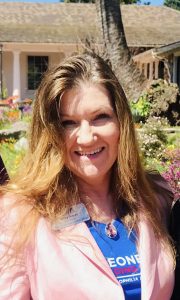The Female Factor: Supporting Women with Hemophilia

An opportunity arises
Five years ago, Ashley Gregory was asked to head The Female Factor (TFF), a program sponsored by the Hemophilia Foundation of Northern California (HFNC). According to Ashley, this opportunity brought her out of her shell and helped her to discover an affinity and passion for working with women in need of bleeding disorder support.
HFNC had been hosting regional meetings for women connected to the bleeding disorders community, but attendance was dwindling. Ashley said she quickly realized that a yearly retreat not only would be a stronger draw, but also a vehicle to promote education, empowerment, and support.
TFF worked hard to educate and equip women affected by bleeding disorders in Northern California. In general, the region is full of pioneers and innovators, but when it comes to hemophilia, previously there were no programs to support women. Some hemophilia organizations supported women, but they were geographically distant and inaccessible to Ashley’s local peers.
Planning a gathering
Armed with the motto “Affected and Connected,” Ashley gathered a committee. Her goal was to welcome every single woman who identified with the bleeding disorders community. The retreat was open to women with bleeding disorders, as well as cousins, sisters, mothers, nieces, friends, partners, and more. Any woman who felt connected and was willing to be supportive and an advocate was invited to attend. They all brought perspectives and experiences that Ashley knew would be valuable.
The annual retreat was born in 2015, when 11 women and a social worker gathered at a beach house in Santa Cruz, California. The National Hemophilia Foundation provided the programming, and expenses were covered by the company Pharma & Specialty Pharmacies.
“We had never had an unencumbered time and space to talk about issues,” Ashley told me in a phone interview. “We sat at the table the first night and kept talking until there was nothing left to say.”
She noted that it was a special moment for all of the women in attendance.
Continuing support
As Ashley gathers her planning committee for TFF’s fifth retreat, she is using the successes from previous retreats and building them into programming for the next year. The group has added more structure and consultations with bleeding disorder experts, and has worked to expand the program’s scope.
Workshops are held to teach women how to self-infuse by administering lifesaving intravenous factor products, which is critical knowledge. They also are coached to live their best life with a bleeding disorder.
Relating to hemophilia struggles
Ashley’s own struggles to access equitable treatment fuel her passion for educating women, she said. None of California’s hemophilia centers have clinics designed specifically for adult women. Innovative programs that exist in other parts of the U.S. combine hematologic and gynecologic treatment into one comprehensive clinic appointment for adult women with bleeding issues. According to Ashley, treatment in California is often archaic and biased toward men with hemophilia.
“If you happen to have factor levels under 50 percent, you can access DDAVP, tranexamic acid, Stimate, and hormones. If women have low factor levels, they may be ‘lucky’ enough to access actual factor replacement products,” she said.
Ashley said she wants women and the medical community to understand that women with higher factor levels — in the 70s, 80s, and even 90s — and who are carriers of hemophilia can still have bleeding issues. She points to research that backs this up. Yet, even women with factor levels under 50 percent struggle to access appropriate care.
When women complain of pain, they often are told, “It’s not a bleed; you do not need factor replacement products.” Their male counterparts, when in pain, are told to try factor: “If it works, you know it was a bleed.” Sometimes these different messages are given to women and men with identical factor levels.
Ashley hopes that all women with hemophilia-causing mutations will one day have the ability to access factor products and infuse as often as necessary to be healthy. The gender bias in bleeding disorders treatment must stop.
Ashley found a Hemophilia Treatment Center in another state that understands women with bleeding issues, and she was finally diagnosed with a bleeding disorder. However, she has Medi-Cal, California’s Medicaid program, which usually won’t contribute to filling factor prescriptions written by out-of-state doctors. This means that while she has a proper diagnosis, she is unable to fully access the medications she needs.
Unfortunately, Ashley is far from alone in this struggle. She is one of many women who have improved their treatment by looking out of state. Women with private health insurance are more fortunate, as they can fill out-of-state prescriptions and implement treatment plans that Ashley cannot.
“The good news is women with bleeding issues are rising up everywhere,” she said. They are uniting to advocate for equitable diagnosis and treatment. With their passion and dedication, it will happen.
Thank you, Ashley Gregory, for allowing me to share your story.
***
Note: Hemophilia News Today is strictly a news and information website about the disease. It does not provide medical advice, diagnosis, or treatment. This content is not intended to be a substitute for professional medical advice, diagnosis, or treatment. Always seek the advice of your physician or another qualified health provider with any questions you may have regarding a medical condition. Never disregard professional medical advice or delay in seeking it because of something you have read on this website. The opinions expressed in this column are not those of Hemophilia News Today or its parent company, Bionews Services, and are intended to spark discussion about issues pertaining to hemophilia.








Leave a comment
Fill in the required fields to post. Your email address will not be published.